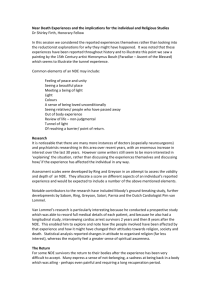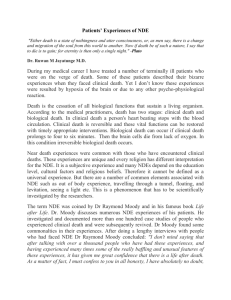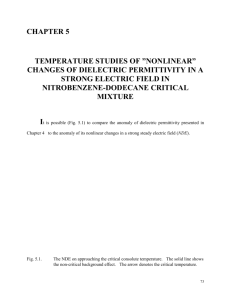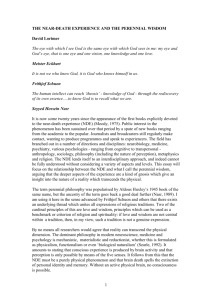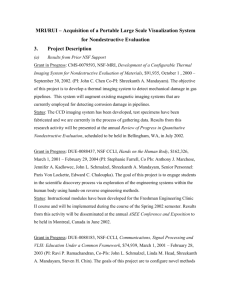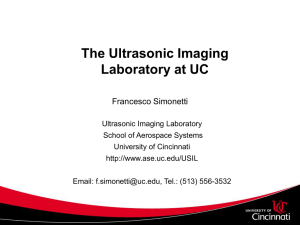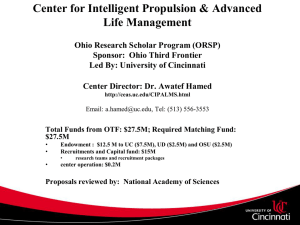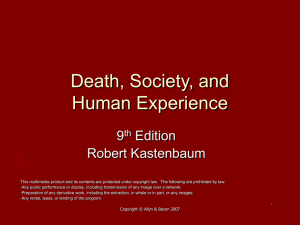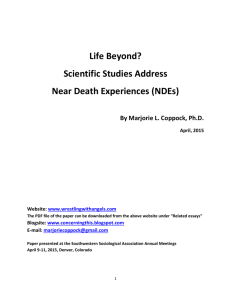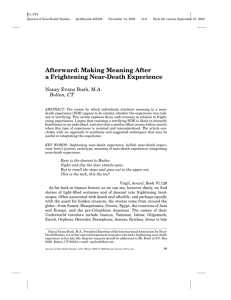Heaven is for real and near death experience - Creative
advertisement
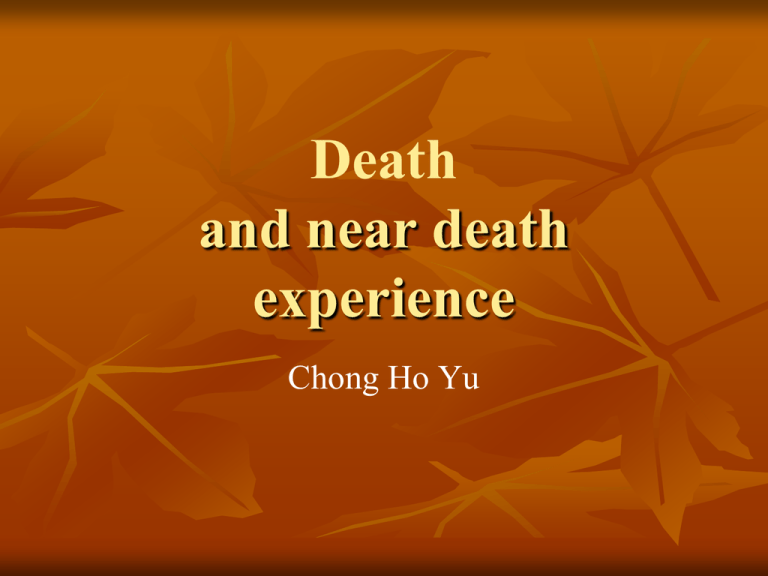
Death and near death experience Chong Ho Yu Bering’s view of afterlife Opposed to the “comfort hypothesis”: people have religions because we want to reduce death anxiety. The concpet of afterlife is a natural tendency. Bering’s studies Children’s play with puppet rats and alligators. Student favorable ratings for the dead. Content analysis of obituaries Students tend not to cheat when they heard ghost stories. In the Chinese culture the topic of “death” is a taboo. There are many alternate words for “death.” You should never mention the word “death” in front of old people. There is a Chinese “ghost” festival as a memorial for the dead, but the atmosphere is sad and terrifying. There is nothing like “the Day of the Dead.” No one will make fun of death. Day of the Dead Unlike the Chinese culture that regards death as a taboo, Mexicans celebrate the Day of the Dead by focusing on remembering the positive sides of their deceased family members and friends. The decorations are colorful and even humorous. Day of the Dead The origin of the Day of the Dead can be traced back to the Aztec tribe. At first it was banned the Spanish Catholic Church Later this tradition was merged with the Catholic AllSaints Day. Some beautiful women painted half of their face or their whole face like a "sugar skull". No matter how gorgeous these girls are, someday they would turn into corpses. This reminds me that all of us are nothing but a living dead. As Existentialism states, death is the absolute threat that forces us to acknowledge the limit of our existence. Sugar skulls, as the name implies, are skull-shaped sugar. The tradition of making skull-like sugar started from the 17th century. At that time Mexicans pressed sugar into sugar skulls to represent their family members or friends who passed away. Forest Lawn Cemetery Forest Lawn Cemetery Forest Lawn Cemetery Forest Lawn Cemetery Forest Lawn Cemetery Consider this scenario: A Chinese friend visits you and you invite him to visit some museums and art galleries. He is very excited and asks, “Where shall we go?” You reply, “Forest Lawn!” Could you imagine his reaction? Assignment Choose a non-Western culture or religion (not China) and discuss how their religious beliefs influence their attitude towards death and vice versa. Near Death Experience (NDE) One explanation of religion: Fear of death Paul Tillich: existential threat of non-being Is it possible that “afterlife” results from a wishful-thinking? Is there life after death? Colton is the son of a part-time pastor and a businessman in Nebraska who owns a garage door company. Before Colton was very sick, his father was also ill and the family go into financial problems. Is there life after death? During emergency surgery Colton slips from consciousness. He survives and begins talking about being able to look down and see the doctor operating and his dad praying in the waiting room. Is there life after death? When his father helped him to re-collect what Colton experienced in Heaven, his father tried NOT to ask any leading questions. Rather, he let Colton use his own words. Is there life after death? Colton said he met his miscarried sister, whom no one had told him about, He talked about his great grandfather who died 30 years before Colton was born, then shared impossible-to-know details about each. He could recognize his great grandfather from an old photo. Is there life after death? Another child did many drawings and paintings about what he saw in heaven and Jesus. Colton said that all the portraits of Jesus in church does not resemble Jesus, except the one drawn by another child. Near death experience NED Coined by Dr. Raymond Moody in 1975 NDE is estimated to occur to a third of people who come close to death. Near death experience feelings of peace hearing unusual noises seeing a dark tunnel being out of the body meeting spiritual beings encountering a bright light or “being of light,” panoramic life review a realm where all knowledge exists coming back into the body Andrew Newberg Andrew Newberg “Some hallucinogenic drugs produce experiences that have many characteristics of near-death experiences. However, NED also appear to have some other elements that are not typically found with drug states—such as the life review or the notion that it is time to go back. Furthermore, most NEDs result in powerful consequences for the individual in terms of how he or she thinks about death and life, which are not common with drug-induced states.” Andrew Newberg Near death experience Bruce Greyson is the Chester F. Carlson Professor of Psychiatry and Director of the Division of Perceptual Studies at the University of Virginia Health System Children’s NDEs are similar to those of adults, but usually they didn’t have a life review or meetings with dead friends and relatives. Colton is an exception. Arguments against NDE No variables, such as age, gender, race, or history of mental illness, could predict NDE. Popular explanation: Oxygen deprivation, fatigue Oxygen deprivation usually leads to frightening hallucinations, but NDE is peaceful and joyful. Michael Shermer saw “aliens” in a bike marathon Military trainees saw a sea monster due to lack of sleep Arguments against NDE Drug effects? UCLA psychologist Dr. Ronald Siegel claimed that he could reproduce NDEs by giving LSD to participants. But drug induced hallucinations often result in fearful and paranoid experiences Although some drugs may create quasi-NDE experiments, prior studies show that patients who receive drugs report fewer NDEs than do patients who receive no drug. From Skeptic to Believer At first Sabom approached the study of NDEs as a skeptic, expecting to find that NDE results from misfirings of a dying brain Sabom studied 116 NDEs and found that NDEs produced a stronger faith and a higher level of commitment to religion. These powerful spiritual experiences was consistent with divine revelation. After NDE Those who experienced an NDE due to a suicide attempt rarely attempted kill themselves again. They obtained a sense of purpose and appreciation for life. After NDE ego-centric to other-centered consciousness tendency to love unconditionally and increased empathy decreased interest in status symbols and materialistic lifestyles reduced fear of death deepened spiritual consciousness believe that everything happens for a reason. Jeffrey Long Only 20% experienced NDEs. Why? Long: For spiritual growth Some people saw Jesus and knew it i.e. The person didn’t say “I am Jesus” Contrary to the popular image: the wounds are on the wrist, not the palm A cross-cultural and trans-religious phenomenon: NDE study didn’t invalidate any religion Nine pieces of evidence claimed by Jeffrey Long 1. Crystal clear consciousness 2. Cardiac arrest EG Flat in 10-20 seconds No blood bumped to the brain Realistic Out of Body experience (OED) Sabbom and Sartori’s study: 92% OBE without any apparent inaccuracy Long’s NEDRF study: 97.6% Nine pieces of evidence claimed by Jeffrey Long Visual NDE (totally blind from birth) NDEs during general aesthesia Life review No external judge Reviewed forgotten memories and validated later Family reunion 96% are dead relatives Surprise encounter of relatives that they never met and late validated Nine pieces of evidence claimed by Jeffrey Long Children NDE Long’s study: 26 young kids, aged 5 or less Worldwide consistency Transform life Arguments against NDE Studies found no relationships between religious beliefs and NDE. Non-religious people, including atheists, were just as likely to have NDE. Contradiction with some Christian doctrine: Some theologians assert that the concept of heaven did not exist in OT. Believers will “sleep” after death and consciousness stops; they will resurrect at the second coming of Christ. Wishful thinking? Why did most people go to Heaven, but very few one went to Hell? Harris Poll: 79% respondents believed they would go to heaven, only 2% thought they would go to Hell. Many NDE research were done by Westerners. Colton and others who experienced NDE talked about seeing Jesus. Did Muslims meet Allah and Buddhists meet Buddha?
